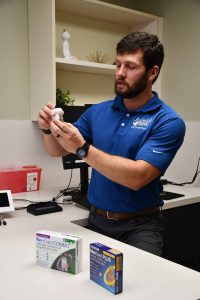When Gleppy, a 2-year-old chihuahua mix, was found as a stray in Forrest County, she was full of energy and eager to greet anyone nearby. But at Southern Pines Animal Shelter in Hattiesburg, staff discovered her biggest challenge wouldn’t be finding a home – it would be surviving a rising heartworm crisis.
“We diagnose about 1 in every 8 dogs with heartworm disease,” said Tamara Huff, shelter director of Hub City Humane Society. “Heartworms are transmitted by mosquitoes … it just takes one bite from one mosquito for your pet’s life to change.”
According to 2024 data from the Companion Animal Parasite Council, 6% of dogs tested in Mississippi were positive for heartworms, compared to a national average of 1%. The American Heartworm Society ranks Mississippi No. 1 in infection rates, followed by Louisiana, Texas, Alabama and Arkansas. In George County, 13% of dogs tested positive in 2024.

Chris Duke, a veterinarian and board member for the national heartworm society, said the 1-in-8 rate is common in Southern shelters, where heat, humidity and standing water create prime mosquito breeding conditions. Heartworms spread when a mosquito bites an infected animal and passes larvae to another. Over six months, worms – which can grow up to a foot long – travel through the bloodstream to vital organs. With mosquitoes active nearly year-round, even a brief lapse in prevention can be dangerous.
“It doesn’t take but a month or two of missed doses in south Mississippi to have a dog convert to heartworm-positive,” Duke said.
He noted that prevention sometimes fails because of cost, miscommunication between owners or pets spitting out medication.
Some owners believe indoor pets are safe, but Huff said mosquitoes get inside. Without prevention, infection is inevitable, said Blake Crawford, a veterinarian at Animal Medical Center in Hattiesburg. Symptoms like coughing, low energy and exercise intolerance are easy to miss, and untreated infections can be fatal.

Treatment is possible but costly. Gleppy, adopted by Roy Howard Community Journalism Center reporter Justin Glowacki, is undergoing treatment that starts with antibiotics to weaken the worms before a series of injections. Dogs must have restricted activity during recovery, as a spike in heart rate can cause a dying worm to break loose and block the lungs.
At shelters, care for a 50-pound dog can cost up to $4,000. In private clinics, Duke said treatment for a large dog can exceed $1,000. The “fast-kill” method involves three injections over three months, while a slower approach can take years and risk ongoing heart and lung damage.
Veterinarians recommend consistent use of approved preventives, including monthly chewables, topical treatments or annual injections. “It’s extremely easy to prevent – and a lot cheaper than the headache of treatment,” Crawford said.
“There are some things in life you can gamble with,” Huff said. “Heartworms are not one of them. It just takes one bite from one mosquito for your pet’s life to change dramatically.”
This report was produced by the Roy Howard Community Journalism Center at the University of Southern Mississippi.




